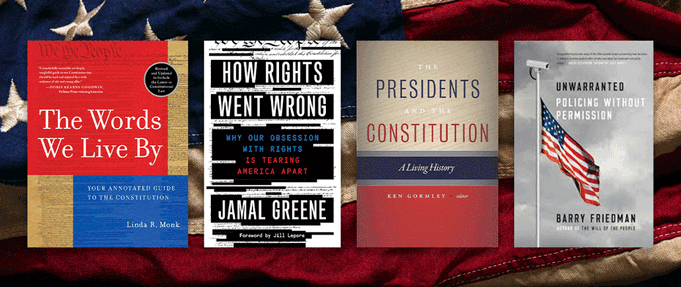More than 200 years ago, 42 men gathered at the Constitutional Convention in Philadelphia, with quill in hand (although only 39 would sign). Amongst those figures were the likes of George Washington, Benjamin Franklin, James Madison, and Alexander Hamilton, who would all come to be known as the Founding Fathers of the United States.
What they were signing was none other than the Constitution, marking the birth of a nation, united under the same guiding principles. Indeed, the first words of the infamous documents are “We the people,” meaning that the government and those in power gain strength from its citizens, those who pledge their allegiance.
This list not only covers the constitution’s origins, but what it has come to mean today, covering complex topics like surveillance, free speech, and, above all, the safeguarding of individual liberty and freedom.
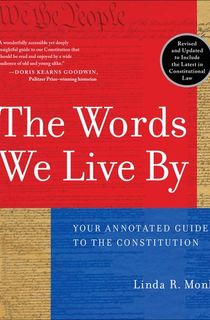
The Words We Live By
Since its conception, the Constitution has been read and understood in myriad ways. In The Words We Live By, author Linda R. Monk reflects on these interpretations and considers a new way of looking at the hallowed document.
Filled with surprising facts and enticing history, Monk takes readers on “a lively and learned exploration,” providing “a new respect for how [the Constitution] has secured freedom and self-government for the last two centuries” (Steve Chapman, columnist for Chicago Tribune).
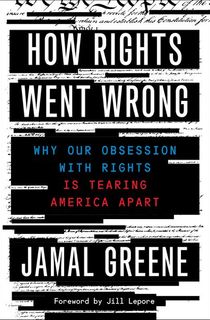
How Rights Went Wrong
Rights are not only the country’s biggest unifiers, but the source of great contention. Jamal Greene, a forethinking scholar with “an eye for the withering zinger,” considers a path to reimagine citizens’ rights (Washington Post Book World).
Rather than bestowing the power upon the select few—judges—Greene suggests returning to the ideals of the Founders by instead leaving rights to legislatures and juries. As New York Times-bestselling author Jill Lepore articulates in the foreword, “It is the argument of this important book that until Americans can reimagine rights, there is no path forward.”
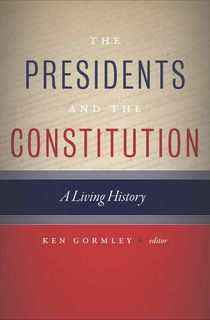
The Presidents and the Constitution
An impressive list of historians and legal experts join forces in The Presidents and the Constitution, bringing readers “everything you ever wanted to know about the Supreme Court and the Presidency but were afraid to ask” (Nina Totenberg, NPR legal affairs correspondent).
By combing through presidential history, these scholars provide a comprehensive overview of each presidency, and how individual presidents interacted with and changed the Constitution. Drawing parallels and challenges, this is a never-before-accomplished study, outlining America’s dense history.
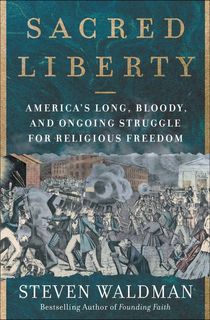
Sacred Liberty
Religious freedom is one of America’s greatest strengths, but it was not always so willfully accepted. In a “compelling study of the most essential breakthrough of modernity,” journalist Steven Waldman explores the key figures who established “the right to believe, or not, as one wishes” (Jon Meacham, Pulitzer Prize-winning author).
Full of fascinating stories and insights, Waldman positions America at the forefront of embracing diversity not only in terms of background but also in faith. He also considers how, in modern times, the nation can continue to preserve this essential pillar.
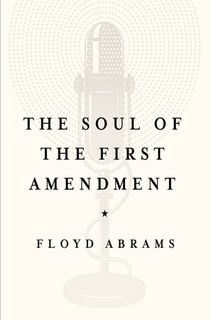
The Soul of the First Amendment
The very first Amendment in the Constitution protects an individual's right to express themselves, through speech, without government interference. And perhaps there is no one better than Floyd Abrams, a lawyer and award-winning legal scholar, who recognizes the significance of this right and sets out to convince readers of the same in this pivotal work.
Exploring legal matters such as the recent adoption of the Bill of Rights to cases like Citizens United, Adams seeks to identify a foundational belief: that to “allow the government to determine whose speech can be regulated [...] is, as [his] fascinating history shows, literally to play with fire” (Wall Street Journal).
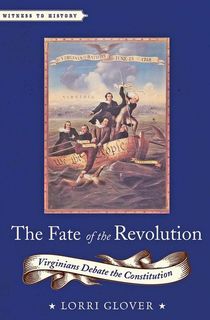
The Fate of the Revolution
In May 1788, delegates from every county in Virginia gathered to decide whether they would accept or reject the United States Constitution. Many of the elects were split, but if they did not reach an agreement, one thing was certain: the fate of the nation was doomed.
Drawing from crucial documents, letters, transcripts, and more, author Lorri Glover depicts the conversations that were not only held in that room, but also echoed through the country—and that continue to influence the modern world.
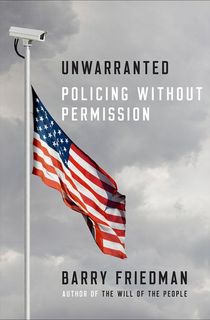
Unwarranted
There are many agencies that police citizens on a day-to-day basis, that work in silence and secrecy. From cops to the FBI, Barry Friedman—one of the country’s leading authorities on constitutional law—spotlights the stories of everyday people, whose lives were ruined by policing that went undercheck by the larger authorities at play.
As Bryan Stevenson, the founder of the Equal Justice Initiative, articulates, “Unwarranted illuminates many of the often ignored issues surrounding how we police in America and highlights why reform is so urgently needed.”
Featured image: SilverV / Canva
